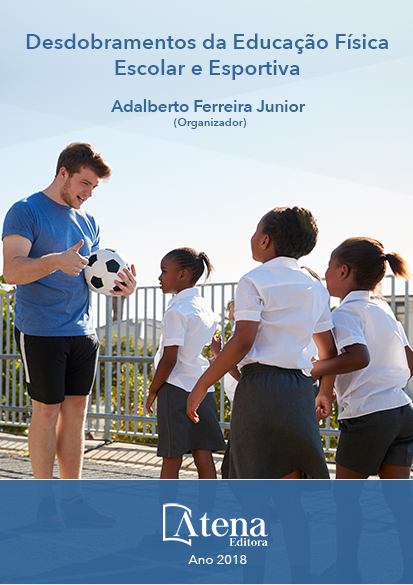
IMPORTÂNCIA DOS JOGOS COOPERATIVOS COM ALUNOS EM SITUAÇÃO DE VULNERABILIDADE SOCIAL: UMA PROPOSTA PARA APLIAR A PERCEPÇÃO AMBIENTAL NA ESCOLA
Com a nova dinâmica social do mundo
pode-se perceber mudanças no comportamento
de crianças em fase escolar, onde em sua
grande maioria aceitar “o diferente” passa a
ser tarefa árdua e vil, tornando-se desafiante
a qualquer professor. Diante de um ambiente
de extrema vulnerabilidade social é possível
defrontar-se com inúmeros fatores de riscos
capazes de comprometer a integridade física
e mental de crianças, adolescentes e também
dos professores. Fatores esses que podem
contribuir negativamente no desenvolvimento
das potencialidades das crianças, em fase
de maturação cognitiva, principalmente ao
que tange à percepção de si e do ambiente
em que se vive. Diante desse contexto,
esse estudo de natureza qualitativa, buscou
compreender o papel dos jogos cooperativos
frente às crianças que vivem em ambientes de
vulnerabilidade social. A pesquisa contou com
a com a participação de 25 crianças, de ambos
os sexos, do ensino fundamental da Rede
Pública Municipal da cidade de Mogi-Guaçu.
Sendo 16 meninos e 9 meninas participantes do
projeto AICA (Atendimento Integral a Crianças
e ao Adolescente), que acontece no período
contrario das aulas regulares. Estes alunos
incluídos na categoria de vulnerabilidade social
e integrantes de comunidades em situação de
risco, de acordo com o Centro de Referência
de Assistência Social (CRAS). Para a coleta de
dados foram utilizados o método de pesquisaação
e autoscópia, através de um corpus
materializado no elemento linguístico escrito
oral associado à imagem e a coleta realizada
através de filmagem e os dados analisados
por meio da Técnica de Análise de Conteúdo.
Os resultados da pesquisa apontaram
comportamentos positivos após a realização
de quatro semanas de atividades recreativas,
sendo uma hora e quarenta por semana
incluindo sessões de autoscopia, atividades
cooperativas e sessões de discussão. As
crianças apresentaram mudanças significativas
em seu comportamento após as sessões,
mostrando melhoras na interação após a segunda sessão das atividades recreativas ,
bem como nas reuniões realizadas com o grupo. Foi possível perceber que as atividades
recreativas despertaram no grupo certa consciência sobre a colaboração para atingir
os objetivos propostos e ainda, o despertar para a importância da ajuda mútua para
se atingir tal resultado. Mesmo se tratando de quatro sessões pode-se notar ainda no
decorrer destas, melhoras sobre a percepção do ambiente e pequenas reflexões de si e
sobre o outro como coadjuvante em todas as etapas. Confirmando a hipótese inicial que
as atividades cooperativas na educação física escolar podem auxiliar na promoção da
autonomia, cidadania, além de promover sentimento de pertença trazendo a valoração
do grupo.
IMPORTÂNCIA DOS JOGOS COOPERATIVOS COM ALUNOS EM SITUAÇÃO DE VULNERABILIDADE SOCIAL: UMA PROPOSTA PARA APLIAR A PERCEPÇÃO AMBIENTAL NA ESCOLA
-
DOI: Atena
-
Palavras-chave: educação física escolar; jogos; cooperação; crianças; vulnerabilidade.
-
Keywords: school physical education; games; cooperation; children; vulnerability.
-
Abstract:
With the new social dynamics of the world one can perceive changes in
the behavior of children in the school stage, where the great majority of them accept
“the different” becomes an arduous and vile task, becoming challenging to any teacher.
Faced with an environment of extreme social vulnerability, it is possible to confront
innumerable risk factors capable of compromising the physical and mental integrity of
children, adolescents and also teachers. These factors can contribute negatively to the
development of the potentialities of the children, in a phase of cognitive maturation,
mainly regarding the perception of oneself and the environment in which one lives.
Given this context, this qualitative study sought to understand the role of cooperative
games in relation to children living in socially vulnerable environments. The research
was attended by 25 children of both sexes, from the fundamental education of the
Municipal Public Network of the city of Mogi-Guaçu. There are 16 boys and 9 girls
participating in the AICA (Comprehensive Care for Children and Adolescents) project,
which happens in the opposite period of regular classes. These students are included
in the category of social vulnerability and members of communities at risk, according to
the Reference Center for Social Assistance (CRAS). For the data collection, the actionresearch
and autoscopy method was used, through a corpus materialized in the oral
written linguistic element associated with the image and the collection made through
filming and the data analyzed through the Content Analysis Technique. The results
showed positive behaviors after four weeks of recreational activities, one hour and forty
per week including autoscopy sessions, cooperative activities and discussion sessions.
The children presented significant changes in their behavior after the sessions, showing
improvement in the interaction after the second session of the recreational activities,
as well as in the meetings held with the group. It was possible to perceive that the
recreational activities awoke in the group a certain awareness about the collaboration
to reach the proposed objectives and also, the awakening to the importance of the
mutual aid to reach such result. Even if it is a question of four sessions, it is possible to
note still in the course of these, improvements on the perception of the environment and
small reflections of oneself and on the other as coadjuvant in all the stages. Confirming
the initial hypothesis that cooperative activities in school physical education can help
in the promotion of autonomy, citizenship, besides promoting a sense of belonging,
bringing the group’s valuation.
-
Número de páginas: 15
- CASSIO JOSE SILVA ALMEIDA


